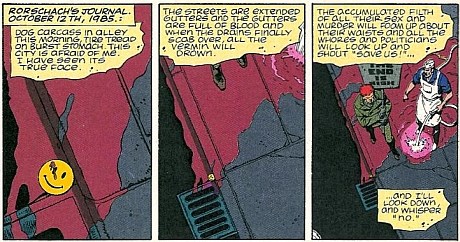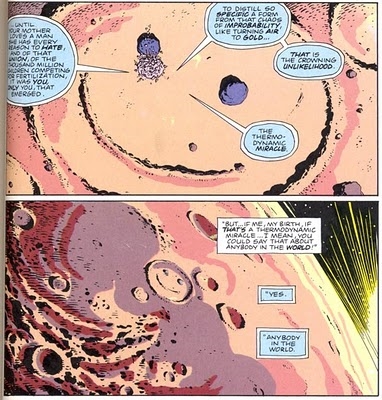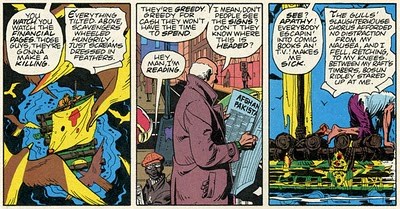 |
| An excerpt from Watchmen (forbiddenplanet.co.uk) |
“Citizen Kane. Sgt. Pepper's Lonely Hearts Club Band. The Sopranos. Watchmen. Of this list, the following can be said: (1) Each is a masterwork representing the apex of artistry in its respective medium; (2) you might have no idea what Watchmen is.” (Jenson)
Many years ago this was true, but now when people mention “Watchmen” they are probably referring to the movie version from the guy who directed 300 with all the 80’s music in it. But many people still have no idea what Watchmen really is, but, then again, that question really isn’t too important. The real question is: who wrote The Watchmen and why? To know the answer to one is to know the answer to the other. Many people reading this article may be aware that Watchmen is actually a Graphic Novel; many of them may not even know what a Graphic Novel is. A Graphic Novel is, in essence, an extended comic book many times bigger than the average comic book, and usually hardbound. A lot of people would probably dispute whether a comic book writer is an “artist”. And for a long time they would have been right, until June of 1989, when Watchmen debuted (Jenson) a truly written masterpiece that was intended to be nothing but art. One man managed to create a new art form out of something that was looked down upon by most of civilized society, and was purely a way to extract money from kids and their parents in most cases. But he created a comic that really managed to be accepted by those who know about it; it even managed to win a Hugo award “the first time a comic had been so honored” (Jenson). He managed to turn a new page in the history of modern art. But that he saw himself as an artist, and nothing more or less, is what makes him my hero.
 |
| another excerpt from Watchmen |
He has shown in many instances that he is no more than a determined man, producing hit after hit with V for Vendetta and The League of Extraordinary Gentlemen. But he still remains a normal man knowing that he isn’t above anyone else no matter what he does. He also knows how to have a little fun. In an interview with Entertainment Weekly, after being asked what comedies he liked, he responded: “Well, over here, at the moment, we've had some very good ones. There's The Mighty Boosh, which is [Laughs] idiotically wonderful, childish, surreal, fantasy. There's also a show called Snuffbox, and it's one of the darkest, funniest comedies I've seen in ages. And I'm a very big fan of South Park.” He also knows that the whole world is watching him, and he doesn’t care! This is best demonstrated in the aforementioned interview with Entertainment Weekly on the topic of being middle-aged: “I was turning 40 and thinking, Oh dear, I'm probably going to have one of those midlife crisis things which always just bore the hell out of everybody. So it would probably be better if, rather than just having a midlife crisis, I just went completely screaming mad and declared myself to be a magician. That would, at least, be more colorful. So, I announced, on the night of my 40th birthday party — probably after more beers than I should have had — that, ''from this point on, I'm going to become a magician.'' And then the next morning you have to think, Oh, what have I said now? Are we going to have to go through with this? So I had to go about finding out what a magician was and what they did.” If and when I become famous I would want to do wacky stuff like that and still be a normal person even though I was famous, even if everyone thought I was too eccentric and comical. Someone who can be themselves even though they are famous is a humble hero in my opinion.
 |
| Political commentary in Watchmen |
Even though he is humble, he knows his craft is nothing less than art and should be treated as such. He was very antagonistic toward a movie being made of his work, even when it wasn’t likely to be made, as he told Entertainment Weekly: “I talked to [director] Terry Gilliam in the '80s, and he asked me how I would make Watchmen into a film. I said, ''Well actually, Terry, if anybody asked me, I would have said, 'I wouldn't.''' And I think that Terry [who aborted his attempted adaptation of the book] eventually came to agree with me. There are things that we did with Watchmen that could only work in a comic, and were indeed designed to show off things that other media can't... I increasingly fear that nothing good can come of almost any adaptation, and obviously that's sweeping. There are a couple of adaptations that are perhaps as good or better than the original work. But the vast majority of them are pointless.”
He controls his work better than most of his artist kin; he knows that there is more to it than just money. I wish everyone would do their job to be happy and not for the money like my hero. But he knows that happiness with his work does require work, as he elaborates to Comic Book Resources in regards to his newest project: The League of Extraordinary Gentlemen: Century -
“And also in the very pacing of the story, we were able to move to a more literary rhythm, or certainly a different dramatic rhythm to that normally employed in adventure comics. I suppose we were perhaps taking the source material for this first part of the third volume as a guideline or a set of guidelines for the way that we should approach the drama in that in Brecht’s “Threepenny Opera,” it is not a fast-paced chase sequence. There’s an atmosphere of brooding menace and sardonic humour that runs through the whole thing. So we thought, well, if that’s good enough for Brecht, that’s basically good enough for us as an essential kind of dramatic tone to the story. The story seemed to demand a fairly climactic pay-off, but we didn’t have to build up to that in the same way that we would have done if it was three 24-page comics instead of one 72-page chapter. We didn’t have to have the same kind of mini-climaxes that you would have had to have done if we’d been doing it as the third volume from DC. The fact that we were free to decide upon this format for ourselves, the fact that it was understood that apart from one-offs like “The Black Dossier,” that volumes of “The League” would be six 32-page comics that would be collected up into a hardback book in the future.”It is necessary for brilliant artists like him to come along every few centuries to inject new life and new insight into their craft. My hero obviously does this to comic books, forcing them to evolve further and further, even past the apex of his career: Watchmen. If I could do this to whatever I do in the future, I will die a happy man.
Dr. Manhatten from Watchmen (iat.ubalt.edu) A hero doesn’t have to save lives, or have their name on billboards and history books. My hero's name hasn’t been said throughout this work because in the end, I don’t think he would want it to. I think he would want to be recognized for his work and not his name, as would I. It's not about credit and fame, nor is it about money or even self happiness. It's about delighting others through your work and to continue doing that no matter how bad, or more likely good, things get. Who wrote The Watchmen and why? A man wrote it, just an average man who got his start writing Swamp Thing in 1983 (Klaw). He did it because he knew he could make people happy and more aware with it, because it's art that people have looked to throughout history for guidance and entertainment. When the ancient Greeks got depressed or were troubled, they would go see a comedy or tragedy, or sometimes even a combination of the two . In that respect my hero is like an ancient playwright, pushing through our dull lives while still leaving an imprint of wisdom through his characters; and the best way to help the world, is to help the men and women who walk it.
"I hate the movie industry [because] if I make a bad comic, it does not cost a hundred million dollars, which is the budget of an emergent small third world African nation. And this is money that could have gone to alleviating some of the immense suffering in this world but has instead gone to giving bored, apathetic, lazy, indifferent Western teenage boys another way of killing 90 minutes of their interminable and seemingly pointless lives." -Alan Moore (Klaw)
from Watchmen 3 (www.rci.rutgers.edu)
Page created on 2/10/2010 12:00:00 AM
Last edited 2/10/2010 12:00:00 AM
Klaw, Rick. "To Hell With Alan Moore." Moving Pictures Mag.. 2006.
Jenson, Jeff. "Watchmen: An Oral History." Entertainment Weekly. 2005.
Moore, Alan. "Alan Moore Still Knows the Score!." Entertainment Weekly. 2008.
Moore, Alan. "Alan Moore’s Bestiary of Fictional Worlds." Comic Book Rescource. 2009.
